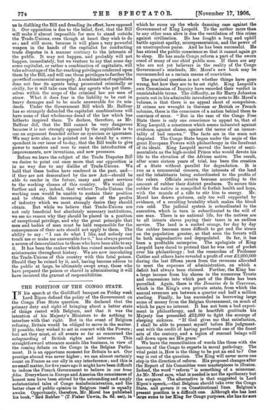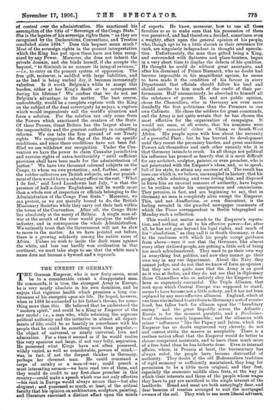THE POSITION OF THE CONGO STATE.
TN his speech at the Guildhall banquet on Friday week Lord Ripon defined the policy of the Government on the Congo Free State question. He declared that the primary duty and right of bringing about a better state of things rested with Belgium, and that it was the intention of his Majesty's Ministers to do nothing to interfere with that right. But in the event of Belgium refusing, Britain would be obliged to move in the matter. If possible, they wished to act in concert with the Powers ; but act they must, at all events so far as concerned the safeguarding of British rights and interests. This straightforward utterance sounds like business, in view of the coming debate on the Congo in the Belgian Parlia- ment. It is an opportune moment for Britain to act. Our prestige abroad was never higher ; we can almost certainly count on France as our ally in any interference ; and this is no small matter, for five years ago it might have been difficult to induce the French Government to believe in our bona fides. Everywhere in Europe and America the consciences of honest men have been stirred by the astounding and amply substantiated tales of Congo maladministration, and the better class of public opinion in Belgium itself is equally awake. Opportunely, therefore, Mr. Morel has published his book, "Red Rubber " (T. Fisher Unwin, 3s. 6d. net), in which he sums up the whole damning case against the Government of King Leopold. To the author more than to any other man alive is due the ventilation of this crime against civilisation. He has fought a,_ long and uphill battle against apathy,,misrepresentation, and the power of an unscrupulous purse. And he has been successful. lie has stirred the public conscience so that it cannot again go to sleep. He has made Congo reform a part of the sworn creed of many of our chief public men. If there are any who are not yet believers in the reality of the Congo Government's misdeeds,' ,Mr. Morel's new book may be recommended as a certain meats of conviction.
The practical question is not whether things have gone wrong, but how they are to be set right. King Leopold's own Commission of Inquiry have recorded their verdict in unmistakable terms. The difficulty, as Sir Harry Johnston points out in his admirable introductory note to Mr. Morel's volume, is that there is no appeal short of compulsion. If crimes are wrought in German or British or French colonies, there is the conscience of a nation behind them to convince of error. " But in the case of the Congo Free State there is only one conscience to appeal to, that of King Leopold, a conscience which seems indurated against evidence, against shame, against th‘ terror of an immor- tality of bad renown." The facts are in the main not disputed. The Congo State began under the aegis of the great European Powers with philanthropy in the forefront of its ideals. King Leopold moved the hearts of senti- mentalists as the high-souled Prince who would devote his life to the elevation of the African native. The result, after some sixteen years of trial, has been the creation of a State without parallel for degradation. It is run as a commercial concern, the interests of the land and the inhabitants being subordinated to the profits of the rulers. Officials receive bonuses according to the amount of rubber their district produces. To secure this rubber the native is compelled to forfeit health and hope, with the muzzle of a rifle to stir him to energy. Mr. Morel has drawn pictures, only too well supported by evidence, of a revolting brutality which makes the blood run cold. The judicial system is subordinated to the executive, which in turn is subordinated to the will of one man. There is no national life, for the natives are to all intents slaves paying their taxes in an endless service. The laud is a sucked orange, for day by day the rubber becomes more difficult to get and the strain on the population greater, so that soon the forests will, be both unproductive and depopulated. So far, it has been a profitable enterprise. The apologists of King Leopold have dared to pretend that he was out of pocket over his philanthropy ; but the researches of Professor Cattier and others have revealed a profit of over £2,000,000 during the last fifteen years from the revenues allocated to meet the expenses of administration, on which a deficit had always been claimed. Further, the King has a large income from his shares in the numerous Trusts and concessions into which part of the State has been parcelled. Again, there is the Domaine de la Couronne, which is the King's own private estate, from which the annual revenues are between a quarter and half a million sterling. Finally, he has succeeded in borrowing large sums of money from the Belgian Government, on much of. which he pays no interest. It has not been a bad experi- ment in philanthropy, and in heartfelt gratitude his Majesty has presented .212,000 to fight the scourge of sleeping sickness. " If God gives me that satisfaction, I shall be able to present myself before His judgment- seat with the credit of having performed one of the finest acts of the century, and a legion of rescued beings will call down upon me His grace." We leave the reconciliation of words like these with the horrors of the Congo to experts in moral pathology. The vital point is, How is the thing to be put an ehd. to P One way is out of the question. The King will never move one step in the direction of reform. His proposed changes after the Report of his Committee were masterpieces in illusion. Indeed, the word " reform " is something of a misnomer. As Mr. Morel says, what is needed is not the apothecary but the surgeon. The alternative is that suggested in Lord Ripon's speechthat Belgium should take over the Congo State, and govern it' on Constitutional lines. Belgium's present position is a difficult one. Although $he has lent large sums to her King for Congo purposes, she has icr sort Of control over the administration. She sanctioned his assumption of the title of " Sovereign of the Congo State." She is the legatee of his sovereign rights there, " as they are recognised by the Declarations, Conventions, and Treaties concluded since 1884." Does this bequest mean much Most of the sovereign rights in the present interpretation which the King has put upon them have not been recog- nised by any Power. Moreover, she does not inherit the private domain, and she binds herself, if she accepts the bequest, " to diminish in no manner its integral revenue," to carry on the present system of oppression. The free gift, moreover, is saddled with large liabilities, and as the land is being sucked dry, it becomes increasingly valueless. Is it worth Belgium's while to accept this burden, either at her King's death or by arrangement during his lifetime ? We confess that we do not see Belgium's advantage in the matter. The best course, undoubtedly, would be a complete rupture with the King on the subject of the dual sovereignty he enjoys, a rupture which would imperatively call the world's attention and force a solution. For the solution can only come from the Powers which sanctioned the creation of the State. Of these Powers, Great Britain has the largest share in the responsibility and the greatest authority in compelling reforms. We can take the firm ground of our Treaty rights. We recognised the flag of the State do specific conditions, and since these conditions have not been ful- filled we can withdraw our recognition. Under the Con- vention we have the power to claim Consular jurisdiction and exercise rights of extra-territoriality " until sufficient provision shall have been made for the administration of justice." We have two thousand coloured subjects on the Congo, to whom we owe protection ; and, further, some of the rubber-collectors are British subjects, and our punish- ment of them would have a salutary effect on the rest. "What I do feel," said Lord Lansdowne last July, " is that the presence of half-a-dozen Englishmen will be worth more than a whole row of inspectors or officials belonging to the Administration of the Congo Free State." Moreover, we can protect, as we are morally bound to do, the British Missionary Societies while they carry out their task within the terms of the Convention. After all, the Congo State lies absolutely at the mercy of Britain. A single man-of- war at the mouth of the river would paralyse the rubber industry, and in consequence the whole Administration. We earnestly trust that the Government will not be slow to move in the matter. As we have pointed out before, there is a growing solidarity among the native races of Africa. Unless we wish to incite the dark races against the white, and lose our hardly won civilisation in that continent, we must take steps to see that the white man's name does not become a byword and a reproach.



























































 Previous page
Previous page